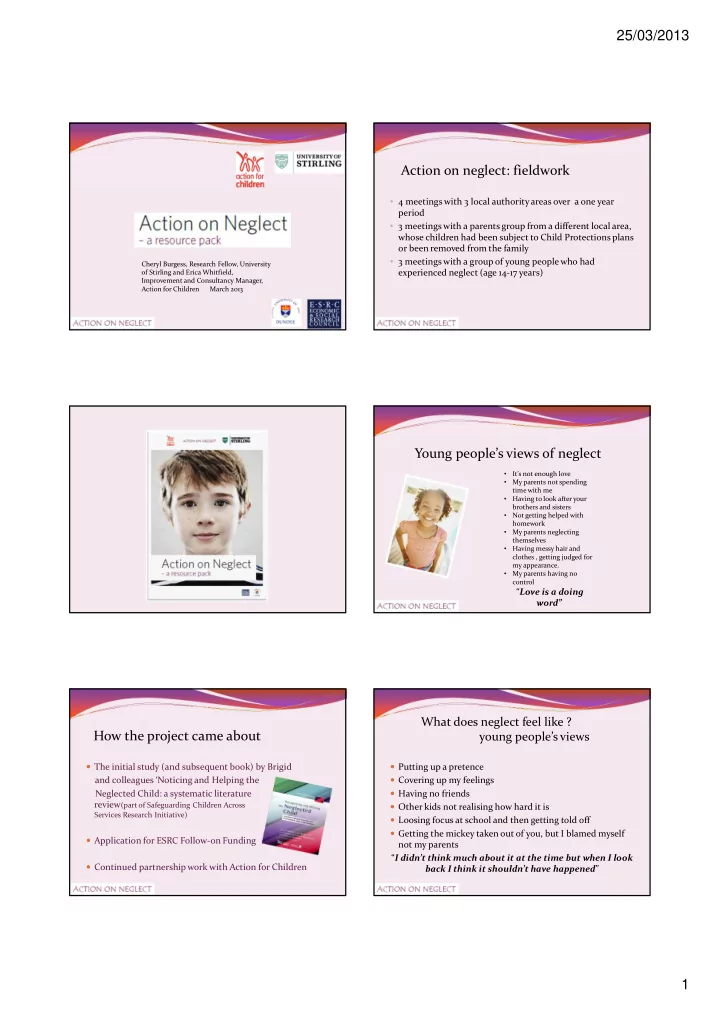

25/03/2013 Action on neglect: fieldwork • 4 meetings with 3 local authority areas over a one year period • 3 meetings with a parents group from a different local area, whose children had been subject to Child Protections plans or been removed from the family • 3 meetings with a group of young people who had Cheryl Burgess, Research Fellow, University experienced neglect (age 14-17 years) of Stirling and Erica Whitfield, Improvement and Consultancy Manager, Action for Children March 2013 Young people’s views of neglect • It’s not enough love • My parents not spending time with me • Having to look after your brothers and sisters • Not getting helped with homework • My parents neglecting themselves • Having messy hair and clothes , getting judged for my appearance. • My parents having no control “ Love is a doing word” What does neglect feel like ? How the project came about young people’s views � The initial study (and subsequent book) by Brigid � Putting up a pretence and colleagues ‘Noticing and Helping the � Covering up my feelings Neglected Child: a systematic literature � Having no friends review (part of Safeguarding Children Across � Other kids not realising how hard it is Services Research Initiative) � Loosing focus at school and then getting told off � Getting the mickey taken out of you, but I blamed myself � Application for ESRC Follow-on Funding not my parents “ I didn’t think much about it at the time but when I look � Continued partnership work with Action for Children back I think it shouldn’t have happened ” 1
25/03/2013 Practitioner groups: local systems and Parents’ views of neglect processes � It’s like you see on the NSPCC adverts � It’s when children are under-weight and dirty � Do systems work? Where are the barriers to children and � Not having enough money to give them the right food and their families getting help? giving them pasta all the time � It can be because of parents drinking or using drugs too � Where do pathways between much services work well and why? � It’s when there is bad language in the house or a violent abusive man � Where are the hurdles? And � It’s when children go to strangers too easily – or when they how can these be overcome? are clingy Practitioner groups: format Practitioner groups: children’s journeys � Overarching themes: understanding, responding to and � Focus on local examples of helping neglected children children’s experiences of being helped � Research summaries and questions to prompt discussion � Development of composite children’s pathways � Use of case studies (from Childhood Neglect : Improving Outcomes for Children Training Materials, DfE) � Getting a way from the language of services - putting the child back in the centre Practitioner groups: reflection and Practitioner groups: barriers and solutions discussion main themes – identifying children � Composition varied between areas Parents’ and practitioners’ perspectives � Structure and keeping to topics v opportunity for free- � Making services ‘easy to reach’ flow and honest exchange of ideas � Parents who resist: who is seeing the children? � Recording the sessions and analysis: the reality of constraints and realistic ‘solutions’ � Filling the gaps and then tuning in to children: opportunities 2
25/03/2013 Practitioner groups: barriers and solutions Practitioner groups: participation main themes- responding to families � Taking time to listen and understand � Opportunities to reflect on practice with those from other disciplines � Dilemma: which children are most in need? � Reminder to keep child at the centre � Forms and meetings: skills and approaches � Solution-focused � Streamlining pathways to help; avoiding duplication � Interest in what parents and young people say Practitioner groups: barriers and solutions Letters from young people and parents main themes- helping children � Being � How a parent: learning the skills from others – combining these were written care with ‘warm authority’ � The letters – seeing things from service users’ perspectives � Schools as a ‘hub of help’ � The experience of being consultants to the project � Adolescent and ‘middle-class’ neglect ‘It was good to hear other young people’s experiences and find out that others had � Balancing parents’ capacity to change with the (daily) been through some of the same things when they were younger’ impact of neglect on a child The pack: other contents And finally……. � Links to practice examples Young people said: ‘take me seriously and really listen’ � Court processes and inspections Parents said : � Theoretical bases of neglect ‘be positive – it’s really hurtful and I can get upset but it’s worth it in the end’. � Research and useful practice materials 3
25/03/2013 For more information please contact: Cheryl Burgess or Erica Whitfield 4
Recommend
More recommend